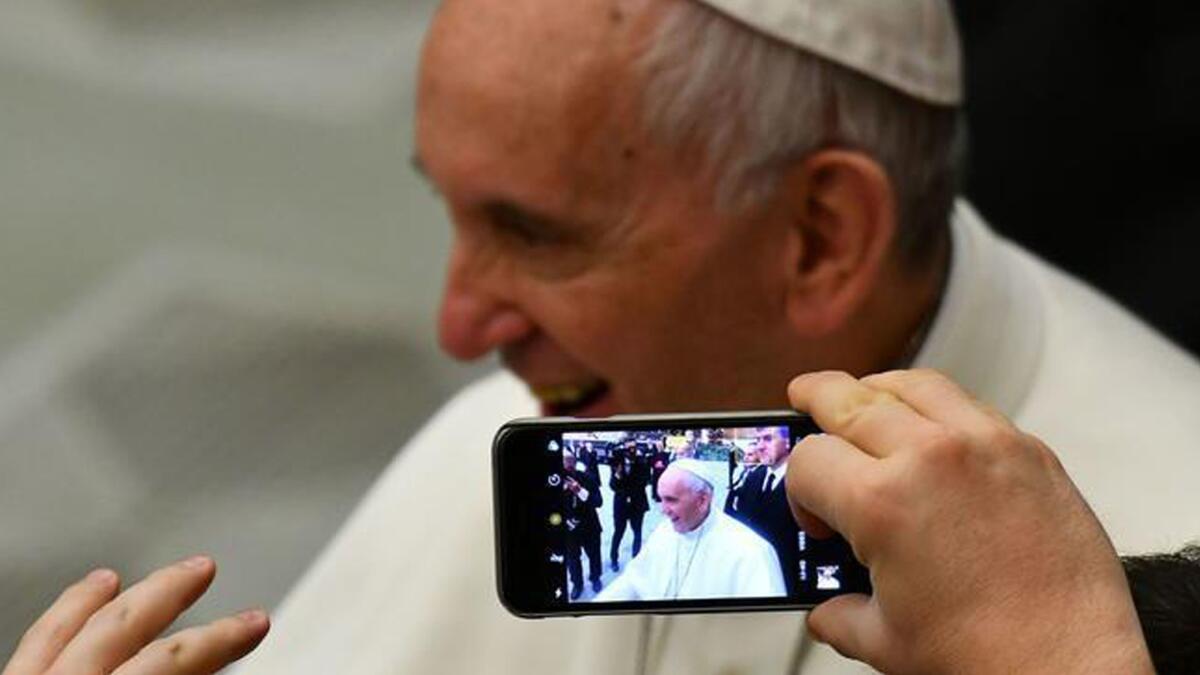Opinion: Sorry, conservative Catholics: The pope isn’t retiring

- Share via
Pope Francis celebrated his 80th birthday on Saturday, and then went back to work.
But if he had never been elected pope — if he had remained Cardinal Jorge Mario Bergoglio — he would now be a pastor put out to pasture. Under church rules, cardinals who turn 80 before the death or resignation of a pope are ineligible to participate in the consistory called to elect the pope’s successor.
This must be a bitter pill for the conservative Catholics who find Francis too liberal in his theology and insufficiently awed by the august office he occupies.
That group runs the gamut from churchmen who profess their loyalty to Francis — such as four cardinals who recently asked the pope to clarify whether a document he issued permits divorced and remarried Catholics to take Holy Communion — to a far-right fringe that regards Francis as an imposter.
In an interview in 2014, Francis indicated that he thought the resignation of Pope Benedict XVI might not be the last such papal retirement. “Benedict is the first, and maybe there will be others,” Francis told an Italian newspaper Corriere della Sera. “We don’t know.”
But Francis is clearly in no rush to join the 89-year-old predecessor in retirement. Nor does he have to. Popes are exempt from the requirement that bishops submit their resignations at age 75. And while turning 80 disqualifies you from choosing the pope, it doesn’t prevent you from serving as pope.
Yet it’s hard to see why the pope should be an exception to a practice of orderly retirement. The argument for popes retiring is that they aren’t kings but bishops. (The Bishop of Rome is regarded in post-Vatican II Catholic theology as the head of the College of Bishops, just as St. Peter is venerated as the head of the “college” of the Apostles.)
Francis, who has embraced what might be called a downsized vision of the papacy, would seem to be a natural candidate for voluntary retirement. So why does he resist the idea?
His conservative detractors probably believe that it’s all about power. Having decided to pursue a liberal agenda, they reason, the wily Jesuit from Argentina isn’t willing to step down until he has packed the College of Cardinals with enough like-minded churchmen to guarantee that the next pope will be made in his image.
A less cynical theory is that Francis might think that one living “pope emeritus” is enough of a jolt to tradition. Having two ex-popes looking over the incumbent’s shoulders might be a bridge to modernity too far. If this theory is right, Francis won’t retire until after Benedict dies.
Francis might also feel that the cardinals who elected him in 2013, when he was 76, expected him to serve past his 80th birthday.
Finally, the pope may think that he has unfinished business and the energy necessary to accomplish it. But isn’t that also true of some of 80-year-old cardinals who have been sidelined? As the pope might put it, who is he to judge that his fellow octogenarians aren’t up to the job?
Follow the Opinion section on Twitter @latimesopinion and Facebook
More to Read
A cure for the common opinion
Get thought-provoking perspectives with our weekly newsletter.
You may occasionally receive promotional content from the Los Angeles Times.











